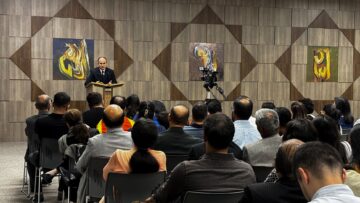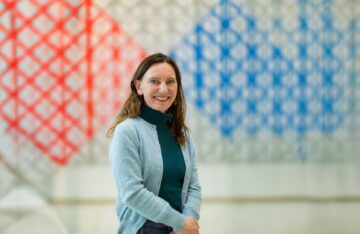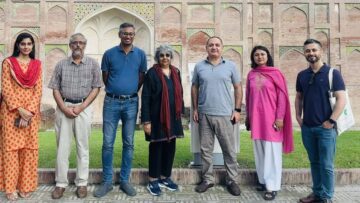The speakers delivered presentations that focused on careers in five areas: (1) academia, (2) the non-profit sector, (3) the Aga Khan Development Network, (4) the Aga Khan Academies and (5) the IIS. Dr. Alnoor Dhanani, Head of Graduate Studies at the IIS, welcomed the guests and about 20 students and staff who attended the programme.
This was followed by a talk by Dr. Ben Fortna, Head of the History Department at the School of Oriental and African Studies (SOAS) and a GPISH lecturer, about careers in academia. Dr. Fortna said that a PhD was often a necessary prerequisite for entering into academia. He explained the procedure for getting into a PhD programme and discussed some of the benefits and drawbacks of an academic career.
The second speaker was Ms. Shehnaaz Latif, a former GPISH graduate who is now working in the non-profit sector for a London-based organisation called The Charities Evaluation Services.
Drawing upon her experiences in the non-profit sector, Ms. Latif discussed opportunities within this sector. According to her, unlike in some other fields, working in this area gives one a chance to understand and analyse issues relevant to people’s needs, influence policy and redefine practice. Ms. Shams Jaffer of the AKDNThe Aga Khan Development Network (AKDN) is a contemporary endeavour of the Ismaili Imamat to realise the ethics and social conscience of Islam through institutional action. More Human Resources Department gave an overview of the goals and background of the AKDN, including current trends in recruitment. She noted that there are more job opportunities available within the AKDN than within other major international development organisations. Many of these opportunities are in the field (i.e., in the various developing countries where AKDN projects exist).
Current areas of focus include social and cultural anthropology, while future opportunities are likely to arise in journalism and the media. Mr. Craig Bradley of the Aga Khan Academies, which are part of the AKDN, gave a synopsis of the Academies Network: a system of primary and secondary schools dedicated to expanding access to education of an international standard of excellence in key locations throughout Africa and Asia.
One of the main areas of current focus in the Academies is faculty and professional development. Mr. Bradley stated that the Academies are looking for trained teachers, especially those with a background in the humanities, who wish to contribute to the development of quality education and are committed to their own professional development.
Lastly, Dr. Amanda Harris, Head of Human Resource Services at the IIS, addressed the participants. She said that the IIS has utilised its students for various research and administrative projects in the past and several graduates now work as full-time staff. The IIS will continue this practice.
One step in this direction is the expansion of the new IIS-HR website for use by graduates so that they can directly access IIS job postings and other information related to working at the IIS. Overall, the Career Pathways Seminar was a timely and relevant opportunity for IIS students and UK-based alumni as they plan their future careers.
The IIS is committed to supporting the transition of its graduates from student life into professional careers and in that context will continue to offer such programmes for its students and alumni in the future.






